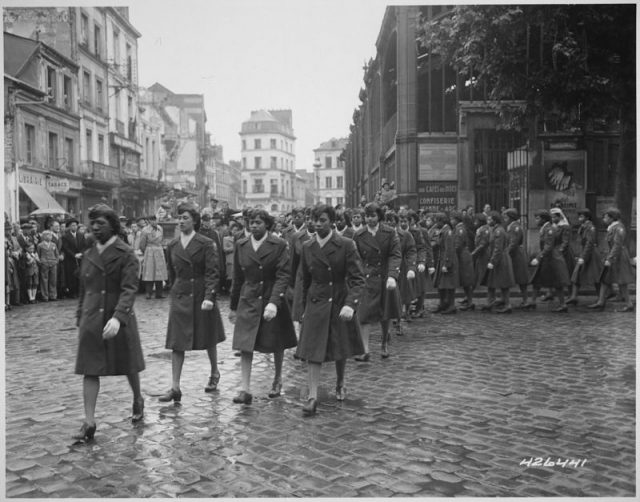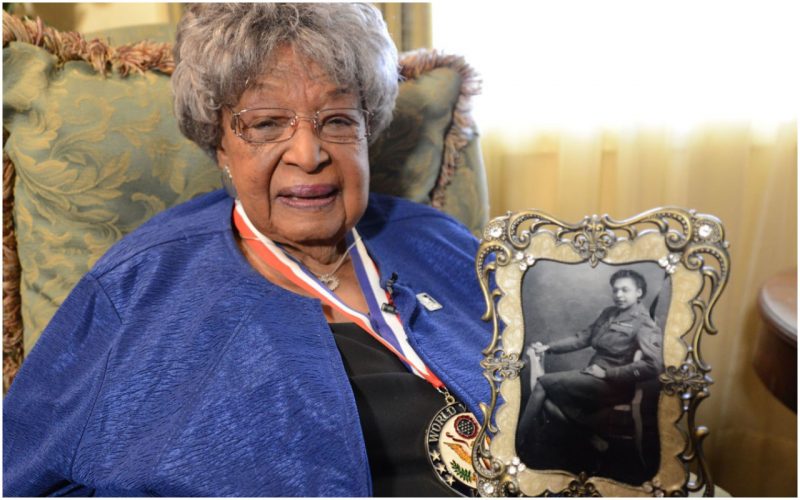Just two years before arriving in Glasgow, Scotland, in 1944, Millie Dunn had never left her hometown of Raleigh, North Carolina. But enlisting had taken her around the country and then overseas, in a voyage that had made her seasick nearly the whole way. One of 800 women in the all-black 6888th battalion en route to Birmingham, England, Dunn gaped at the unfamiliar surroundings of the U.K. Locals stared right back.
“They had never seen any black persons, I don’t guess, because they thought we were women in Technicolor,” she remembered in a 2000 oral history interview with the University of North Carolina at Greensboro. “They said, ‘Oh, look at the women in Technicolor.’ Oh, dear, dear, dear. Those people at that time.”
Millie Louise Dunn was born in Raleigh on January 31, 1918, one of six children. Her grandparents had been born into slavery. She graduated from Washington High School in Raleigh and had a job with the county extension agent’s office.
In 1942, after the U.S. had entered World War II, Dunn saw a poster encouraging women to join the military—white women, that is. “I thought to myself if those white women can do it, so can I,” she told Central North Carolina’s Spectrum News.
Dunn joined the service in 1943, over her mother’s skepticism that she’d pass the medical exams. Before going overseas, she was sent to train in Colorado, Iowa, Texas, and Georgia. “It was the first time I’d ever left home, period,” Dunn told the oral history project.

Dunn was assigned to the all-black unit of the Women’s Army Auxiliary Corps’ Central Postal Directory Battalion, tasked with sorting mail to bolster the spirits of men on the frontlines. The 6888th battalion was over 800 women strong and was the only all-women, all-black unit to serve overseas during WWII.
First Lady Eleanor Roosevelt pushed the War Department to make use of the women’s corps. Millie Dunn was a staff sergeant for the “six triple eight” battalion’s Company B. In three eight-hour shifts, the women sorted through millions of pieces of mail that had piled up in dark, cold, rat-infested warehouses in Birmingham. They had quarters separate from the white women, and slept on beds made of straw.
After Germany’s surrender, on May 8, 1945, the 6888th battalion transferred to France, where it worked for another nine months.
“The women of the 6888th were under an incredible spotlight,” Beth Ann Koelsch, curator of the Betty H. Carter Women Veterans Historical Project at the University of North Carolina at Greensboro, told the New York Times in March. “And they knew that any failure or misbehavior on their part would reflect upon all African Americans and all women. They struggled against prejudice, but in all accounts I have read, these women talk with great pride about their service.”
Three weeks after VE Day, the women of 6888 were honored in a parade commemorating Joan of Arc in Rouen in Normandy. The crowds applauded as the hundreds of black women stepped smartly through the cobble-stone streets in their snazzy double-breasted coats, white gloves, close-fitting narrow hats, and practical low heels.
After Millie Dunn returned to the United States, she attended St. Augustine’s College on the G.I. Bill, where she met Warren Veasey, whom she married in 1949 and with whom she’d have two children.
Millie Dunn Veasey taught school for four years in Virginia before returning to work as a secretary at St. Augustine’s, where she’d remain for three decades, even after earning a master’s degree. She was active in the civil rights movement, marching alongside Martin Luther King, Jr. in the 1963 March to Washington, in which he delivered his famous “I have a dream” speech. Two years later, she became the president of the local chapter of the N.A.A.C.P., the first woman to hold that position.
Millie Dunn Veasey died March 9, a few weeks past her 100th birthday, in her hometown of Raleigh. Up until the very end, she liked to wear a cap emblazoned with her military designations.
“Her hat is her conversation piece,” her niece Elsie Thompson told Central North Carolina’s Spectrum News on the occasion of Veasey’s 100th birthday. “It says, ‘World War II,’ and everybody comes up to her and says, ‘Oh, where did your husband serve?’ She says, ‘Oh, no; I’m the vet.’ ”
